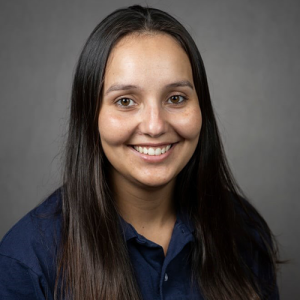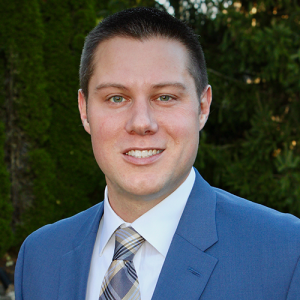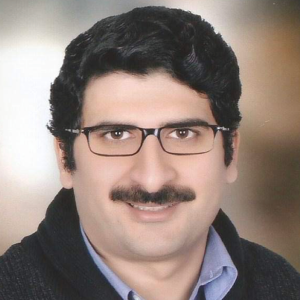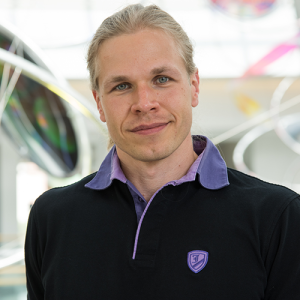Reproduction

July 19, 2024
Cecilia Rocha
Cecilia has extensive experience in the field of reproductive physiology of beef cows. She develops applied and basic research aiming to increase reproductive efficiency in beef operations. Around 40 to 60% of cows lose a pregnancy in the first 30 days of gestation. Cecilia studies the main events that happen in this moment which could be manipulated to reduce pregnancy loss, such as, interferon-tau signaling, immune response of the uterus, and embryo-maternal crosstalk in uterine tissues. Educational background Ph.D. in reproductive physiology, University of Florida Master’s degree, University of Sao Paulo DVM, Federal University of Santa Catarina…

July 2, 2024
Jay S. Johnson
Johnson is an Associate Professor of Animal Welfare and Stress Physiology in the Division of Animal Sciences. The overall goal of his research program is to identify production-relevant stressors and evaluate and mitigate their impacts on livestock health, productivity, and welfare. Johnson’s research program uses an integrative physiology approach encompassing aspects of stress physiology, nutritional physiology, and applied ethology to develop and/or improve upon livestock husbandry practices that enhance animal health and welfare while maintaining or increasing economic return for producers. Specific research areas include improving heat stress resilience in swine through genomic selection, improved management, and nutrition to reduce…

Jan. 23, 2024
Thiago Martins
Our laboratory conducts studies on the topics of hormonal control of the estrous cycle and early embryonic losses in beef cattle. Specifically, we investigate progesterone-based strategies to improve efficiency of estrous synchronization programs for beef cows, embryo-maternal communication, and new fertility-promoting molecules. The research studies involve use of steroid assays, ultrasound, molecular techniques, and omics approaches. Our laboratory is also committed to promoting the use of reproductive biotechnologies in cow-calf operations. Educational background Ph.D., Reproductive Physiology, University of São Paulo M.S., Animal Production, São Paulo State University D.V.M., São Paulo State University…

March 20, 2019
Ahmed Balboula
Dr. Balboula conducted his Ph.D. research in Japan (funded by Egypt-Japan Ph.D. Joint Supervision Program) and his postdoctoral training at the University of Pennsylvania and Rutgers University. Dr. Balboula joined the University of Cambridge in the UK as a Marie Curie Fellow before starting his independent laboratory at the University of Missouri in 2019. Research conducted in the Balboula laboratory employs cutting-edge imaging technologies, transgenic mouse models and genetic approaches to understand the molecular mechanisms regulating mammalian oocyte meiosis and early embryonic development. Dr. Balboula has been recognized with several research awards, including the 2023 SSR Virendra B. Mahesh New…

Nov. 6, 2018
Amanda L. Patterson
Educational background Ph.D., Washington State University, 2013 Courses taught ANSCI 8087: Graduate Seminar in Animal Sciences ANSCI 8434: Special Topics in Reproductive Biology…

Sep. 28, 2018
Corinne Bromfield
Educational background DVM, University of Florida, 2010…

March 7, 2018
Michal Zigo
My field of research is reproductive biology with a specific focus on male fertility, sperm function, and fertilization. Besides reproductive medicine, this work profoundly affects policy making, informing major decisions concerning human reproductive health, contraception, and individuals’ reproductive rights. I have been advancing our understanding of how the ubiquitin-proteasome system (UPS), the universal protein recycling machinery, regulates the process of sperm capacitation necessary for sperm ability to fertilize eggs in humans and animals. I described the UPS-regulated, capacitation-induced re-modeling of the sperm proteome. I identified new UPS-regulated sperm proteins and developed a new protocol for selective, compartment-specific isolation of proteins…

March 5, 2018
Jordan Thomas
Jordan Thomas is an assistant professor in the Division of Animal Sciences at the University of Missouri. Dr. Thomas is a Missouri native and University of Missouri alumnus, having earned his Ph.D. in Animal Sciences with an emphasis in Reproductive Physiology in 2017. Dr. Thomas maintains an active applied research program in reproductive management of beef cattle, coordinating the breeding program for cattle across the University of Missouri Agricultural Experiment Station Research Center herds. Additionally, Dr. Thomas is active in collaborative efforts in education and outreach, such as the Show-Me-Select Replacement Heifer Program, the National Center for Applied Reproduction and…

Nov. 1, 2017
Rocío Melissa Rivera
Rocío completed her M.S. at Iowa State University in the laboratory of the late Dr. Steve Ford. She then pursued a doctoral degree in the laboratory of Dr. Peter J Hansen at the University of Florida. For her post-doctoral training, Rivera worked in the laboratories of Dr. Richard Schultz and Dr. Marisa Bartolomei at the University of Pennsylvania. She attended the Frontiers in Reproduction course in 2007. She joined the Division of Animal Sciences at the University of Missouri as an assistant professor in fall of 2007. In fall of 2019, Rocío participated in the Master of Biology and Technology…

Nov. 1, 2017
Allison Meyer
My overall research objective is to improve efficiency and productivity in beef cattle production through strategic nutritional management of the cowherd. I am especially interested in physiological adaptation mechanisms of pregnant females to their nutritional environment that allow for maternal maintenance and fetal growth. An additional major interest is the developmental programming implications of maternal nutrition when this adaptation is not possible and fetal development is impaired. This overall objective includes investigation into applied production implications as well as systemic physiological, tissue-level, and cellular mechanisms.